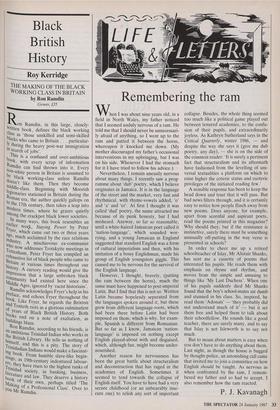Black British History
Roy Kerridge
THE MAKING OF THE BLACK WORKING CLASS IN BRITAIN by Ron Ramdin
Gower, £35
Ron Ramdin, in this large, closely- written book, defines the black working class as 'those unskilled and semi-skilled blacks who came to Britain . . . particular- ly during the heavy post-war immigration in search of jobs'. This is a confused and over-ambitious ,book, with every scrap of information Ramdin can find thrown into it. Every be person in Britain is assumed to De black working-class unless Ramdin doesn't like them. Then they become Middle-class. Beginning with Moorish legionaries stationed in Britain during the Roman era, the author quickly gallops on to the 17th century, then takes a leap into Modern times, where he grazes quietly among the crackpot black lower societies. In many ways, this book resembles an earlier work, Staying Power by Peter Fryer, which came out two or three years ago, much acclaimed by the race relations 14„,,thistrY. A mischievous ex-communist who now addresses Trotskyite meetings in T°ttenham Peter Fryer has compiled an exhaustive list of black people who came to Britain at various times throughout our history. A cursory reading would give the Impression that a large unbroken black Middle had existed here since the Middle Ages, ignored by 'racist historians'. Ramdin acknowledges Fryer's help in his preface, and echoes Fryer throughout the book. Like Fryer, he regards the Brixton and Toxteth riots as a glorious culmination books years of Black British History. Both nooks end on a note of exaltation, as buildings blaze. Ron Ramdin, according to his friends, is an ambitious Trinidad Indian who works in the British Library. He tells us nothing of himself self and this is a pity. The story of onidadian Indians would make a fascinat- ing book. From humble slave-like begin- nings, as 19th-century indentured labour- Trinidad they have risen to the highest ranks of literature society, in banking, business, literature and law. They deserve a history book of their own, perhaps titled 'The Making of a Professional Class'. Over to you Mr Ramdin.


















































 Previous page
Previous page